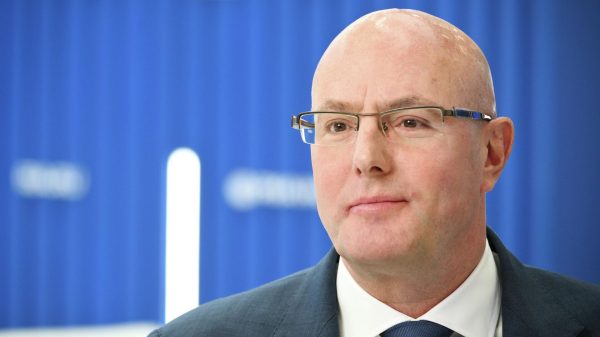 Gatwick Airport boss Stuart Wingate says the abolition of VAT-free shops has damaged the destination's appeal among wealthy passengers. Photo: JULIAN SIMMONDS
Gatwick Airport boss Stuart Wingate says the abolition of VAT-free shops has damaged the destination's appeal among wealthy passengers. Photo: JULIAN SIMMONDS
Rishi Sunak's tourism tax has put Gatwick at a «competitive disadvantage» compared to its overseas rivals, the airport's chief executive has said.
Stuart Wingate, who has headed Britain's second-largest airport since 2009 year, said the removal of duty-free trading had hampered Gatwick's ability to attract wealthy passengers and long-haul airlines from overseas.
He told The Telegraph that the tourist tax was holding back development of the hub, especially as Gatwick competes with European rivals including Madrid, Milan and Paris.
Mr Wingate is the latest senior business leader to take part in the debate surrounding the government's abolition of duty-free shopping for tourists in 2020, resulting in goods becoming 20% cheaper.
“Our position is that we, along with London and the South East, are at a competitive disadvantage because when passengers are thinking about where should I go and which city should I choose, part of the decision-making is whether they can make purchases with tax. -free,” he said.
“Some of these passengers want to buy significant volumes of goods. But if you want to come to the heart of London and buy luxury goods, then you might want to think twice.»
Fresh criticism of the tourist tax, first raised by Mr Sunak when he was chancellor in 2020, could reignite debate as the Tories and Labor try to appeal to businesses ahead of the general election.
Mr Wingate added: «We will continue to say, whoever the government is, we feel we are at a disadvantage compared to other capital cities.»
It comes as Gatwick implements its biggest expansion project over the past decades, costing £2.2 billion.
The London travel hub, which recorded 41 million passengers in 2023, is seeking to expand its operations by converting an emergency runway into a regular runway, paving the way for more flights and passengers.
According to Mr. -at Wingate and in the Gatwick planning application this would be achieved by simply moving the emergency runway just 12 meters to the north, freeing up enough space for the existing runway to operate separately.
This, in turn, will open the way for tens of millions of people. more flights a year, drawing criticism from local residents and environmentalists.
Gatwick's so-called Northern Runway proposal would increase capacity from 55 flights per hour to around 70.
While it will inevitably increase emissions and noise, Mr Wingate insisted that expanding Gatwick is one of the best ways to stimulate economic growth and boost Britain's appeal as an island trading nation. Leaders believe it will add £1 billion to the region's economy each year and create 15,000 jobs.He said the expansion was crucial given Heathrow's third runway remains in a state of disrepair planning purgatory.
 Gatwick's so-called Northern runway will increase capacity from 55 flights per hour to around 70. Photo : Yui Mok/PA
Gatwick's so-called Northern runway will increase capacity from 55 flights per hour to around 70. Photo : Yui Mok/PA
«Heathrow is at capacity at the moment,» Mr Wingate said. “And during the peak summer months, Gatwick Airport is currently operating at almost full capacity.
“This is by far the fastest way for the country to create a significant number of additional peak hours.”
Mr Wingate, who previously headed Budapest and Stansted Airport before joining Gatwick in 2009. , said his team's proposal had been sound for seven years.
If given the green light by the Planning Inspectorate and the Government next year, Mr Wingate said Gatwick was ready to start construction immediately. He said the project would be fully funded by private investment from its owners Vinci Airports and Global Infrastructure Partners
Unlike Heathrow's long-term expansion plan, which has yet to be unveiled and has an estimated cost of around £14 billion, Mr Wingate said Gatwick's proposal was more modest and feasible.
“What I don't want is what I need.” constantly comparing yourself to Heathrow,” he said. «Because they don't seem to be working on the Heathrow [third runway] scheme, but when they were working it didn't seem to be fully calculated.
«What we're talking about here is — this is something that is definitely within our ability to fund. By definition, the work we do is relatively simple.
«What's the difference between Gatwick and Heathrow? Heathrow is to the west of a city of about eight million people, whereas our area is comparatively sparsely populated and rural.»
 Heathrow's proximity to London has proven an obstacle to proposals for a third runway. Photograph: Jack Taylor/Getty Images
Heathrow's proximity to London has proven an obstacle to proposals for a third runway. Photograph: Jack Taylor/Getty Images
The viability of the project is strengthened by the fact that it would be entirely on Gatwick land, he said, reducing the level of local opposition.
«We are not proposing to buy anyone's home or anyone's business,» Mr Wingate said.
«If you are proposing something where you are going to interfere with rail lines or motorways or buy people's homes, it is going to be very expensive and difficult to implement.»
«What we are proposing is to build virtually everything on our existing land.»
Aside from the fact that the project will help Gatwick overtake Heathrow in the coming years, Mr Wingate has been vocal about his intention to lure back one of his rival's flagship carriers: Virgin Atlantic.
Once a base on Gatwick's runways, Sir Richard Branson's airline left the airport during Covid amid financial turmoil and based its operations solely at Heathrow.
Mr Wingate has said he would welcome Virgin back «at the earliest opportunity».
As well as Virgin, Mr Wingate is also courting long-haul carriers overseas, with a recent charm campaign leading to recruitment by Singapore Airlines.
“When I first came here we had about 30 long-haul routes. » he said. «Stansted had none, and the vast majority of them were at Heathrow. Today, I think we serve about 54 different destinations around the world.
“We're moving into Asia and India because we believe these are the fastest growing long-haul markets, if we establish ourselves in these markets now, as they grow, Gatwick will become a natural destination for them to serve London.”
However, to ensure, that London will retain its crown as a global transport hub, Mr Wingate said policymakers also had a job to do to help the industry, eliminating the tourist tax would be a good start.
“I think London's fundamentals are strong. more than ever,» he said. «But we have to care about it and understand who we're competing with and what they're offering.»























































Свежие комментарии